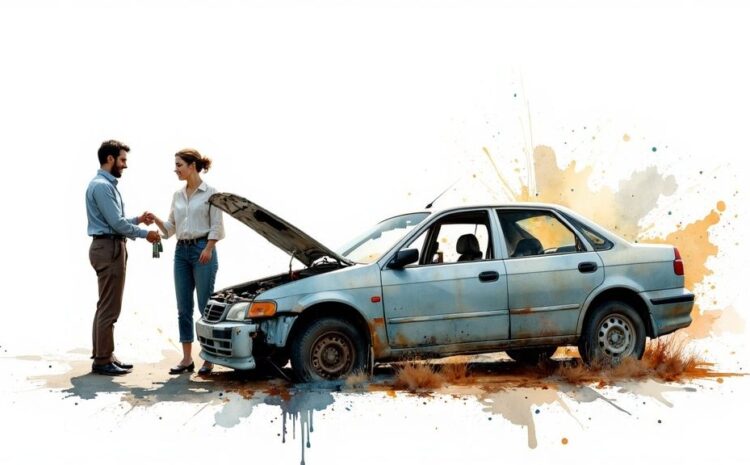
How to Sell My Non Running Car for the Best Price
So, that car sitting on your drive that won't start? It’s not just an eyesore; it’s an opportunity. Deciding to sell my non running car is often the smartest move you can make, freeing up space and putting some unexpected cash in your hand. The secret is knowing that even a dead car has value, either for its reusable parts or simply its weight in scrap metal.
This guide is your roadmap. We’ll walk through everything from getting a fair valuation to sorting the DVLA paperwork and waving goodbye as it’s towed away for free. Let's cut through the jargon and get you paid.
When a car refuses to start, it could be anything from a simple dead battery to a seized engine. For most people, the prospect of a massive repair bill just doesn't add up, especially on an older vehicle. That's when selling becomes the obvious, stress-free choice.
And you're certainly not the only one in this position. The UK's used car market is enormous, with nearly 2 million cars changing hands in just one quarter last year. A whole industry exists to buy cars in any state, letting you sidestep MOT failures and expensive garage quotes entirely. You can explore the latest trends in the UK's used car market to see just how active it is.
A word of advice from experience: don't spend a penny on repairs before getting a valuation. Unless you're sitting on a rare classic, you’ll almost never get that money back in the sale price. Always find out what it's worth as is first.
Your Selling Options at a Glance
When you're ready to sell, you've got a few different routes you can take. Each one offers a trade-off between how much money you'll get, how quickly it happens, and how much work you have to put in.
To make it easier to see which path might be right for you, here’s a quick look at the main avenues for selling a non-running vehicle.
| Selling Method | Best For | Potential Payout | Effort Level |
|---|---|---|---|
| Online Car Buying Services | Speed and convenience. Ideal if you want a guaranteed sale with minimal hassle and free collection. | Moderate | Low |
| Local Scrap/Salvage Yards | A very fast sale for quick cash, especially for older cars with little salvage value beyond metal weight. | Low to Moderate | Low |
| Private Sale (e.g., eBay, Gumtree) | Niche or desirable models that enthusiasts might want for parts or as a project. | Potentially High | High |
| Auctions | Classic, rare, or specialist vehicles where competitive bidding could drive up the price. | Variable | Moderate to High |
Ultimately, the best choice depends on what you value most. If your priority is a quick, guaranteed sale with zero fuss, an online service is hard to beat. If you have a more sought-after model and don't mind putting in the time, a private sale could bring a better return.
So, What's My Non-Running Car Actually Worth?
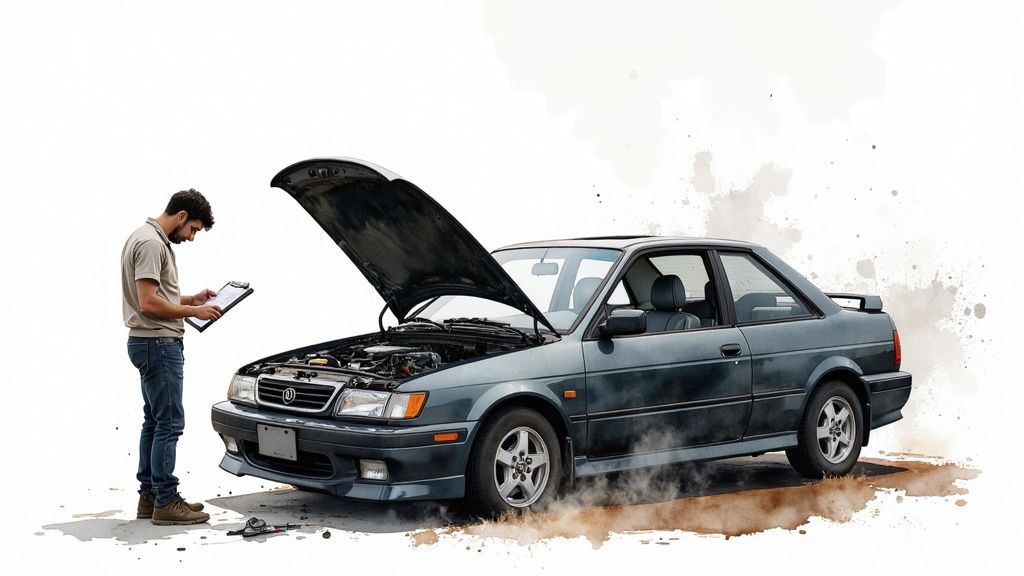
Let's get straight to the point: the biggest question on your mind is probably, "How much cash can I actually get for this thing?" It’s tempting to think your car is just a lump of metal destined for the crusher, but that’s rarely the whole story. The real value is a mix of different factors, and different buyers will see different potential in it.
The make, model, and age of your car are the obvious starting points. For example, a 10-year-old Audi with a seized engine is far from worthless. It's packed with desirable parts—leather interior, alloy wheels, navigation system—that a specialist breaker would happily pay good money for. On the other hand, a 20-year-old common hatchback with similar issues might be valued much closer to its simple scrap weight.
That's why grabbing the first quote you get is a mistake. You need to get a feel for what makes your car valuable to the right buyer.
Looking Beyond Just Scrap Metal
To get a true sense of the value, you have to put yourself in the buyer's shoes. They aren't just buying a car that won't start; they're buying a collection of reusable parts and a specific weight of recyclable materials.
Here’s what they’re really looking at when they make you an offer:
- Salvageable Parts: Components like the catalytic converter (which contains precious metals), the gearbox, alternator, and even body panels in decent nick can all be removed and sold on. If your car is a rarer model, its parts will be in higher demand and fetch a better price.
- Vehicle Weight: This is the baseline. For cars that are truly at the end of the road, their weight in scrap metal gives them a floor value. This price can shift daily based on global metal markets, but it’s the absolute minimum you should expect.
- Location and Access: This is a practical one. How easy is it to get a recovery truck to your car? If it’s stuck down a narrow lane, in a multi-storey car park, or axle-deep in a muddy field, the offer might be slightly lower to cover the extra hassle of collection.
The market for these vehicles is surprisingly lively. With over 2 million used cars sold in a single quarter recently, the demand for affordable spare parts is massive. This directly fuels the ecosystem for non-runners, creating more opportunities for you to get a good deal.
How to Get a Quote You Can Trust
The best way to get a fair price is to be prepared. Don't feel pressured to take the first offer that comes your way. A bit of homework puts you firmly in control of the conversation.
A great place to start is by using an online calculator to see what your scrappage might be worth. Once you have a ballpark figure, reach out to a few different buyers—try a couple of national services and a local salvage yard or two to get a good comparison.
When you speak to them, be totally upfront about the car’s condition. Tell them why it doesn’t run and mention any major dings, rust, or missing parts. Honesty now prevents any awkward haggling later.
Here’s a pro tip from my own experience: take clear photos. Snap pictures from every angle, get a shot of the interior, and make sure you capture the mileage on the odometer. Sending these over with your quote request shows you're serious and helps buyers give you a firm, accurate price from the get-go.
By getting a few different quotes, you’ll quickly build a clear picture of what your car is genuinely worth on the market. It empowers you to pick the best offer and ensures you walk away with the most cash in your pocket.
Right, let's get the paperwork sorted. This is easily the most critical part of selling your non-running car. Get this wrong, and you could be facing fines or find yourself legally tied to a car you no longer even own. It’s not just about getting a good price; it’s about protecting yourself.
The absolute cornerstone of any car sale in the UK is the V5C logbook – that's your registration document. This is the official proof that you're the registered keeper. Any reputable buyer, whether they're a scrap dealer or a salvage specialist, will insist on seeing it. It's how they know the deal is above board.
Having everything lined up and ready to go makes a massive difference to how quickly you can get the car off your drive and the money in your bank. It’s not a minor detail; it’s the key to a fast, hassle-free sale.
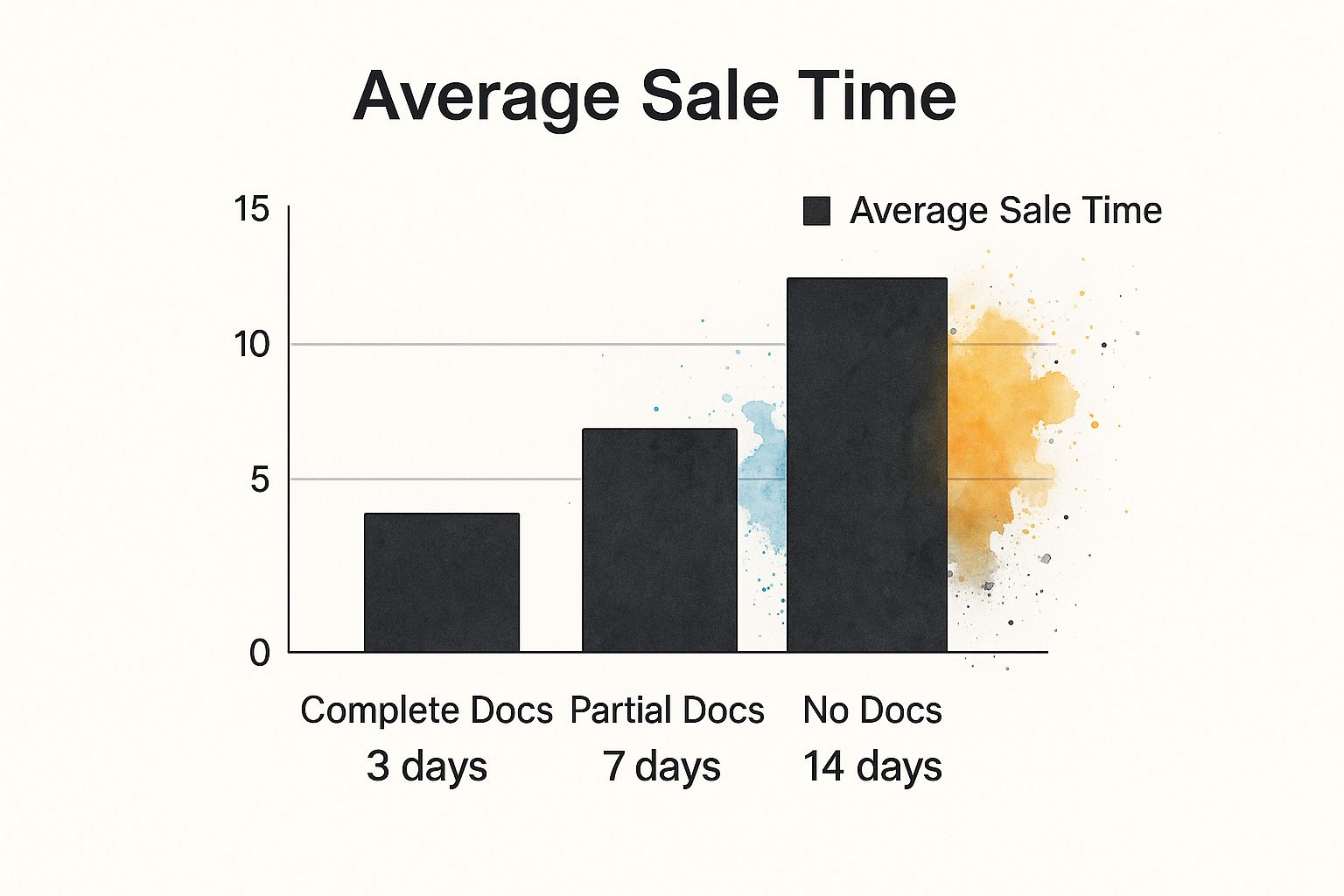
As you can see, being prepared can literally cut the time it takes to sell my non running car from a couple of weeks down to just a few days.
Getting the DVLA Paperwork Right
To ensure you're legally covered when you sell your non-running car, there are specific steps you must take with the DVLA. It’s not complicated, but it has to be done correctly. The table below breaks down exactly what you need and what you need to do with it.
DVLA Paperwork Checklist for Selling Your Non Running Car
| Document | Purpose | Action Required by Seller |
|---|---|---|
| V5C Logbook | Proves you're the registered keeper and is required to transfer ownership. | Complete Section 4 (for sales to motor traders/dismantlers), have the buyer sign it, detach this slip, and send it to the DVLA. The buyer takes the rest of the V5C. |
| Certificate of Destruction (CoD) | Confirms the vehicle has been legally and permanently destroyed by a licensed facility. | You don't create this, but you must receive it from the Authorised Treatment Facility (ATF) within 7 days of the car being scrapped. This is your final proof. |
| Receipt of Sale | A personal record of the transaction, detailing the buyer, date, and price. | Always ask the collection driver for a signed receipt. This, along with your V5C slip, is your immediate proof of sale until the official DVLA confirmation arrives. |
Following these steps is your best defence. It creates a clear paper trail that confirms the exact moment the car ceased to be your responsibility.
What to Do with Your V5C Logbook
When you sell to a scrap or salvage company, you’re dealing with the motor trade. This has a specific process. You need to fill out Section 4 of the V5C, which is clearly marked 'Selling or transferring your vehicle to a motor trader, insurer or dismantler'.
Both you and the collection driver should sign this section. You then tear off this small slip and post it to the DVLA. The driver takes the main part of the V5C document away with them. Simple.
Crucially, do not just hand over the entire V5C document and walk away. Your legal responsibility for the vehicle only ends once the DVLA has been officially notified. That little signed slip is your proof until the letter from Swansea lands on your doormat.
Lost your V5C? It happens. You can easily apply for a replacement from the DVLA either online or by post. While some buyers might still take the car without one, it can complicate things and might even knock a few quid off the offer. It’s always, always better to have it ready.
The All-Important Certificate of Destruction
If your car is destined for the great scrapyard in the sky, there’s one final, vital document you need: the Certificate of Destruction (CoD). This isn't just a receipt; it's a legally binding document proving your car has been properly disposed of at an Authorised Treatment Facility (ATF).
An ATF is a scrapyard that's been licensed and meets strict government standards for safely depolluting and recycling vehicles. Only a registered ATF can issue a CoD.
This certificate is your ultimate protection. Here's why:
- It officially ends your legal responsibility. The ATF notifies the DVLA electronically when the CoD is issued, and just like that, the car is no longer in your name.
- It shields you from future fines. Without a CoD, if the car were to be patched up and put back on the road illegally, you could still be held liable for it.
- It's your proof of responsible disposal. You know your old car has been recycled in an environmentally sound way, not just left to rust in a field.
The ATF is legally required to issue the CoD within seven days of destroying your vehicle, and you should get confirmation by email or post. Before you agree to the sale, always confirm the buyer is a registered ATF and that a CoD will be issued. It’s the final piece of the puzzle and gives you complete peace of mind.
Choosing the Best Buyer for Your Vehicle
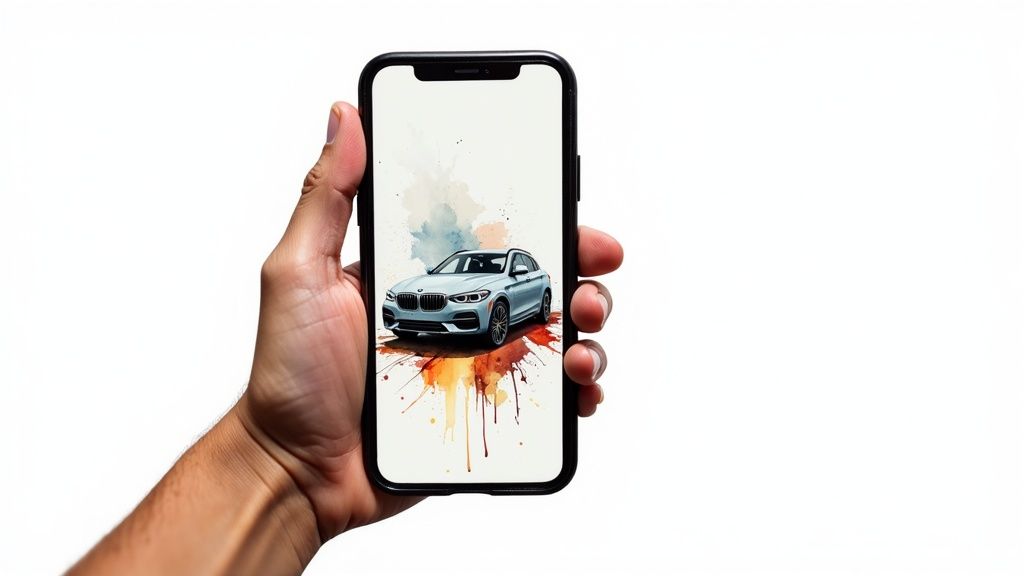
Figuring out who to sell your non-running car to is a big decision. It's what determines how much money you'll get and how much of a headache the whole process will be. In the UK, you’ve got a few different paths you can take, and each one has its own pros and cons.
Your main choices boil down to national online car buyers, local scrap yards, and private buyers like mechanics or hobbyists. Who you choose really depends on what's most important to you. Are you after the absolute best price, the quickest sale, or the least amount of faff?
National Online Car Buying Services
For most people, this is the path of least resistance. National services are set up to buy cars in any state, non-runners included. Their main selling point is pure convenience. You pop your details into a website, get a quote in minutes, and they’ll come and collect the car for free. Payment is sorted with a quick bank transfer.
The whole system is designed to be smooth and simple. The trade-off? The price might not always be top-dollar. Their offers are often based on standard formulas—make, model, age, and weight—which might not reflect the true value of salvageable parts, especially on a more sought-after car.
If you just want the car gone by next week with zero haggling and a guaranteed payment, an online buyer is probably your best bet. It’s the definition of a hassle-free sale.
Local Scrap and Salvage Yards
Going with a local scrap or salvage yard is the more old-school approach. The big advantage here is often same-day service. You can call them in the morning, have the car gone by the afternoon, and get paid on the spot. This works brilliantly for very old or common cars where the value is pretty much just the weight of the metal.
The downside is that you’ll have to put in a bit more effort. It means ringing around a few different yards to compare quotes and being ready to haggle a little. You'd be surprised how much prices can differ between them, so never take the first offer. For cars with more significant issues, our guide on how to sell a salvage car successfully offers some extra pointers.
Selling to a Private Enthusiast
Got a classic, a rare model, or something with a bit of a cult following sitting on your drive? A private sale could be your golden ticket. An enthusiast or a mechanic looking for a project will see potential where a scrap dealer just sees a pile of metal. They’re often willing to pay a premium for a solid restoration base or for specific parts they need.
Be warned, though: this route demands the most time and patience. You'll be the one creating listings, taking decent photos, and fielding calls from people who might not even show up. While the UK's new car market is strong, with registrations hitting 1.04 million units in the first half of the year, the used market is where these older gems live. This option is really only for those with something special who aren't in a desperate hurry to sell.
Collection Day: The Final Handover and Getting Paid
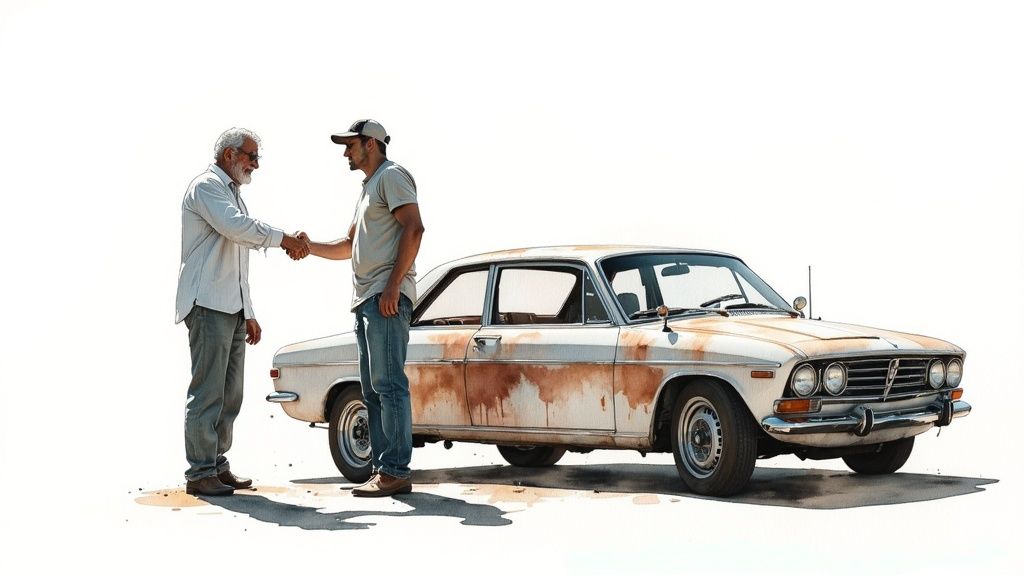
The day the recovery truck arrives is the moment of truth. This is where everything comes together. A little bit of prep work here can make the entire process smooth and stress-free, ensuring you get paid and can finally wave goodbye to that old car.
Before the driver turns up, do one last sweep for your personal belongings. You'd be surprised what gets left behind – check the glove box, under the seats, and in the boot. It’s also a good idea to make sure the car is easy to get to. If it's tucked away in a tight spot, give the collection company a heads-up so they can bring the right gear.
What the Driver Will Do
When the collection driver arrives, their main job is to confirm the car is what you said it was, sort the final paperwork, and get it loaded up safely. They’ll give it a quick once-over to check its condition. This is exactly why being upfront and honest about any damage or missing parts from the very beginning is so crucial – it avoids any awkward haggling or price drops on your driveway.
Once they're happy, they'll walk you through the last bits of paperwork. Don't be rushed; take a moment to read everything before you sign.
You can expect a professional driver to:
- Show up within the agreed-upon time window.
- Have company identification ready to show you.
- Assess the vehicle and its location for a safe and efficient recovery.
- Guide you on how to correctly fill out the V5C logbook section.
Getting Paid and Sealing the Deal
This is the part that matters most. When you sell my non running car to a proper, reputable company, you will never be paid in cash. Thanks to the Scrap Metal Dealers Act 2013, it's actually illegal for scrap car buyers to pay with physical money. This law was brought in to clamp down on metal theft, so any company waving a wad of cash at you is breaking the law and isn't to be trusted.
Key Takeaway: A legitimate buyer will pay you via an instant bank transfer or a business cheque. Do not, under any circumstances, hand over your keys or the V5C logbook until you have seen the money safely in your bank account. This is your most important piece of protection.
Before that car is winched onto the truck, you need to have two things sorted:
- Confirmation of Payment: Open your banking app and physically see that the transfer has cleared. Don't just take their word for it.
- A Signed Receipt: The driver must provide you with a proper company receipt. It should clearly state the price, date, and their company details.
Once the money is in your account and you've torn off the relevant section of the V5C to send to the DVLA, you can hand over the keys. At that point, the car is no longer your responsibility. You’ve successfully turned a problem vehicle into cash in the bank.
Got Questions About Selling Your Non-Runner?
Even when you've got a plan, a few questions can pop up. Selling a car that doesn't run throws up some unique situations, and it's easy to feel a bit stuck. Let's tackle some of the most common queries we get from sellers.
Think of this as your quick-reference guide for those last-minute bits of confusion. We'll clear up everything from lost paperwork to your legal duties, so you can go into the sale feeling confident and prepared.
Can I Sell a Non-Running Car Without a V5C Logbook?
Yes, you can, but I’ll be honest—it makes things trickier and almost always means you'll get a lower offer. Any reputable buyer needs solid proof that you're the legal owner. Without that V5C, they're taking a big risk, and the price will reflect that.
The cleanest, simplest solution? Apply for a replacement V5C from the DVLA before you even start trying to sell. If you're really in a hurry and can't wait, you'll have to provide other forms of ownership proof. This usually means:
- A detailed, signed receipt for the sale.
- Photo ID, like your driving licence or passport.
- Any other paperwork you have, such as old MOT certificates or service records.
A word of advice from experience: buyers are naturally wary of cars without a logbook. Getting that replacement V5C sorted first makes the whole process smoother, more secure, and will almost certainly put more money in your pocket.
What Happens If I Forget to Tell the DVLA I’ve Sold My Car?
This is a serious one. Not telling the DVLA you've sold the car is a mistake that can cost you dearly. Until you officially notify them, you are still the legally registered keeper. That means you’re on the hook for anything that happens with that vehicle.
You could find yourself responsible for:
- Unpaid road tax.
- Speeding tickets and parking fines.
- Any connection the car has to criminal activity.
On top of all that, you could be hit with a fine of up to £1,000 for failing to update the keeper details. It's your legal responsibility to fill out your section of the V5C and get it sent off right away. Always hold onto your receipt from the buyer until you get that letter from the DVLA confirming you're no longer the keeper.
Does My Car Need to Be Declared SORN Before Selling?
It all depends on its current situation. If the car is kept off a public road and the tax has run out, it absolutely must have a SORN (Statutory Off Road Notification) in place to avoid automatic fines. If it’s still taxed, you don't need to do a thing.
When you sell the car, the SORN doesn't pass on to the new owner; it's tied to you. Your legal responsibility—whether the car is taxed, insured, or SORN—ends the moment you correctly inform the DVLA about the sale. After that, it's the new owner's problem. If you have a more specific question, you can probably find the answer in our comprehensive FAQ section.
How Much Should I Expect to Pay for Towing and Collection?
Zero. Absolutely nothing. Any professional, legitimate car buying service will include free collection as part of the deal. The price you're quoted should be the exact amount of cash you get, with no surprise charges or deductions for towing when they show up.
Before you agree to anything, ask them straight up: "Is free collection included in this offer?" If a company tries to charge you for collection or haggles the price down on your doorstep, see it as the massive red flag it is and be prepared to walk away. Trustworthy buyers are always upfront about their costs from the very beginning.
Ready to turn that non-runner into cash without the hassle? At Fast Scrap Car, we provide fair, guaranteed quotes with free, same-day collection across London and Surrey. Get your instant valuation now and see how easy it can be. Find out more at https://fastscrapcar.co.uk.
